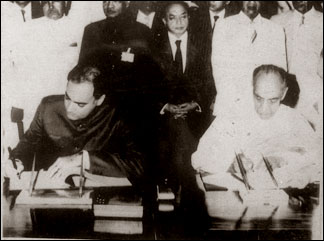A flashback: Indo-Lanka Peace Accord
by Panchamee Hewavissenti
|

The Indo-Lanka Accord signed between Rajiv Gandhi and J.R.
Jayewardene
|
The rationale behind signing the agreement between India and Sri
Lanka was the social, economical and political development of Sri Lanka
facilitated by India. The agreement was signed by Indian Prime Minister,
Rajiv Gandhi and former Sri Lanka President J. R. Jayewardene in Colombo
on July 29, 1987.
Extracts from the Accord are as follows.
1. Recognition of the unity, sovereignty and territorial integrity of
Sri Lanka. It was the emphasis on the maintenance of ' unity' and
'territorial integrity'.
2. The union of the Northern and Eastern Provinces into a single
administrative unit for a period of one year with an elected Provincial
Council, a Governor, a chief Minister and a Board of Ministers.
3. Cessation of hostilities throughout the island within forty-eight
hours. The surrender of all arms held by Tamil militants, within
seventy-two hours to the authorities designated by the Sri Lankan
government. Lifting of the state of Emergency in the north and East by
15 August and confining the Sri Lankan army and other security personnel
to their barracks, as at 25 May 1987.
4. A referendum to be held, on or before 31 December 1988, in the
Eastern Province enabling the Tamils, Muslims and Sinhalese residents
there to decide whether they wished to be administratively linked with
the Northern Province (predominantly Tamil), or constitute a separate
administrative unit. A simple majority outcome would suffice.
5. Elections for the new Provincial Councils to be held within three
months, those in the North and East in the presence of Indian observers.
6. A general amnesty for all Tamil militants, including those
detained or convicted. This was to gain the consent of many Tamil
militant groups to the Accord. The declared objective was the
rehabilitation of Tamil militants into the mainstream of Sri Lankan
polity.
7. Repatriation of 150,000 Tamil refugees from India to Sri Lanka.
8. India was to ensure that its territory was not used for activities
prejudicial to the unity, integrity and security of Sri Lanka.
Furthermore, India was to provide military assistance and training in
order to implement these proposals and to prevent Tamil militant groups
from continuing to infiltrate Sri Lanka. Joint naval and coastguard
operations would be carried out to enforce this.
Exchange of letters
The letter sent by the Indian Prime Minister Rajiv Gandhi to the Sri
Lankan President J. R. Jayewardena.
Excellency,
1. Conscious of the friendship between our two countries stretching
over 2 millennia and more, and recognizing the importance of nurturing
this traditional friendship, it is imperative that both Sri Lanka and
India re-affirm the decision not to allow our respective territories to
be used for activities prejudicial to each other's unity, territorial
integrity and security.
2. In this spirit, you had in the course of our discussions agreed to
meet some of India's concerns as follows.
i. Your Excellency and myself will reach an early understanding about
the relevance and employment of foreign military and intelligence
personnel with a view to ensuring that such presence will not prejudice
Indo - Sri Lanka relations.
ii. Trincomalee or any other ports in Sri Lanka will not be made
available for military use by any country in a manner prejudicial to
India's interests.
iii. The work of restoring and operating the Trincomalee oil tank
farm will be undertaken as a joint venture between India and Sri Lanka.
iv. Sri Lanka's agreements with foreign broadcasting organizations
will be reviewed to ensure that any facilities set up by them in Sri
Lanka.
3. In same spirit India will
i. deport all Sri Lankan citizens who are found to be engaging in
terrorist activities or advocating separatism or secessionism.
ii. provide training facilities and military supplies for Sri Lankan
forces.
4. India and Sri Lanka have agreed to set up a joint consultative
mechanism to continuously review matters of common concern in the light
of the objectives stated in paragraph and specifically to monitor the
implementation of other matters contained in this letter.
5. Kindly confirm, Excellency, that the above correctly sets out the
agreement reached between us. Please accept, Excellency, the assurance
of my highest consideration.
Your's sincerely, Rajiv Gandhi.
Tamils' response to the Accord
Although the reaction in general of the Tamils in Sri Lanka was
favourable, there was a notable reluctance voiced by some groups most
mainly the LTTE. Accordingly the failure lay in not discussing the terms
of agreement with the LTTE. However in response to such views
Jayewardene said that the LTTE were parties to the Accord , but later
abrogated it when they broke the ceasefire in October 1987. However the
LTTE maintained it was not aware of the inclusions of the accord.
However the euphoria when signing the Accord proved to be short
lived. By October 1987, the Accord became obsolete and violence erupted.
In 1988 Premadasa entered in to negotiations with the LTTE. Both
parties considered the IPKF (Indian Peace Keeping Force) as a foreign
army working towards worsening the ethnic conflict. The final result was
the IPKF withdrawing from Sri Lanka soil. |
